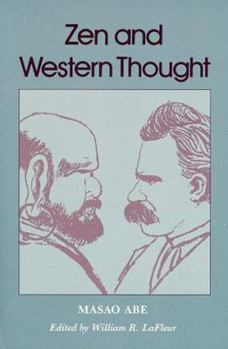Abe: Zen and Western Thought Pa
(Book #1 in the Zen and Western Thought Series)
Select Format
Select Condition 
Book Overview
This collection of Abe's essays is a welcome addition to philosophy and comparative philosophy. This description may be from another edition of this product.
Format:Paperback
Language:English
ISBN:082481214X
ISBN13:9780824812140
Release Date:February 1989
Publisher:University of Hawaii Press
Length:332 Pages
Weight:0.89 lbs.
Dimensions:0.8" x 5.5" x 8.4"
Customer Reviews
3 ratings
a profound challenge and disorientation to one's own ego-identity
Published by Thriftbooks.com User , 15 years ago
Abe's book presents a challenge for westerners who have grown up with the common secular notion that the ego is the non-negotiable center of one's existence and dualism is an essential value that is not to be questioned. Abe helped me begin to understand that dualism and non-dualism both have a place and legitimate function in human development, yet his emphasis is overwhelmingly on the practical explication and integration of a non-dual understanding of human existence. One of the most profound aspects of the book for me regards Abe's explanation that "Emptiness" itself is the true-self (as opposed to the idea that the true-self is emptiness) which has helped me better understand D. Loy's thesis that a human being's most fundamental fear is not death (e.g., E. Becker's), but rather the "fundamental ungroundedness of Being." Abe presents the idea of a "dehomocentric" nature of Buddhism, which has some compatibility with a Jungian notion of the need for the ego to subordinate itself to the Self, but more importantly suggests the fundemental existential ground for the realization of true community and the transformation of fundemental or normal narcissism. He states, "we find ourself equal, not as children of the one God, but in the common realization of egolessness or Emptiness [e.g., def. as "dynamic spontaneity"], which at the same time is the realization of the true Self. Realization of egolessness is not something negative, like losing one's self-identity, but rather is positive in that through this realization one overcomes one's ego-centeredness and awakens to Reality, that is, to one's own true Self as well as the true Self of others. It is in this awakening that one can live with others in true community, sharing the realization of the true Self" (p. 212). Abe emphasizes the importance of the experience of "spiritual death" (e.g., Christ's "kenosis" as a "self-emptying" of the narcissistic ego-identity) for this realization to be possible. Overall, this book is unique in its depth of analysis of western philosophy from a Zen Buddhist perspective, despite its recognizable absolutist strain and the metaphysical speculations that accompany the Zen Buddhist view.
THE MISSING LINK !
Published by Thriftbooks.com User , 20 years ago
BETWEEN ZEN AND WESTERN THOUGHT. MASAO ABE TRULY DESERVES READING. A FANTASTIC EXPOSURE OF A VERY WELL PREPARED SCHOLAR ON BOTH AREAS. THE WESTERN WORLD MEETS EAST. VERY GOOD READING!
Increase your SAT score by 200 points
Published by Thriftbooks.com User , 21 years ago
Fabulous book. I read it when I was sixteen and it was my second book on philosophy. I had to keep a dictionary beside me as I read it because the vocabulary was esoteric, but it made me want to read it more. It changed the way I thought about things and helped me see relationships between events and ideas that at first glance might seem unrelated. In seeking to understand this book, I exposed myself to a way of thinking very alien to my experience up until that point. It was very rewarding. I highly recommend it if you want to glimpse something greater of yourself. Doing nothing else unusual except reading 2/3 of this book and praying, my SAT scores leaped from 1150 to 1350. It is the best book of its kind. Truly. After reading it, most autobiographical works of modern WEstern Zen practitioners will seem flat and trite. If nothing else, you will better be able to discern what is crap in Zen literature.





